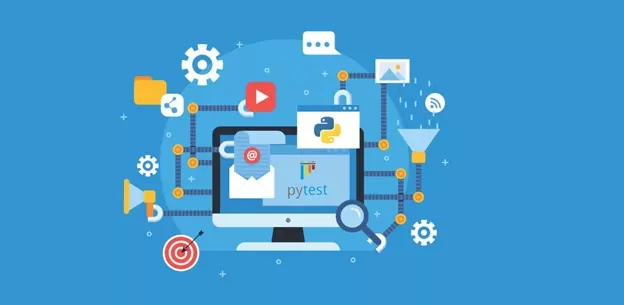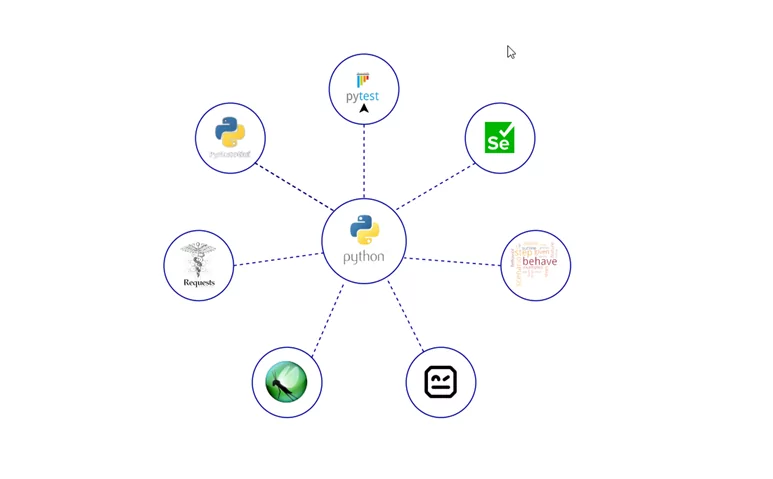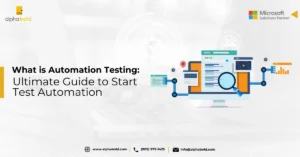In the dynamic landscape of modern software development, the strategic implementation of automated testing is not just a technical consideration but a key business enabler. As C-level executives, understanding the impactful role of test automation in driving operational efficiency, enhancing product quality, and accelerating time-to-market is crucial. This is where Python emerges as a game-changer. Known for its simplicity and effectiveness, Python is a tool for developers and a strategic asset for businesses aiming to stay ahead in a competitive market.
In this insight, we delve into how Python, renowned for its ease of use and robust community support, can revolutionize your software testing process. By adopting Python in your test automation strategies, you’re not just optimizing resources but are making a calculated investment in the quality and reliability of your software products. This decision directly contributes to higher customer satisfaction, reduced costs, and a sharper competitive edge.
Join us as we explore seven key Python automation choices that can transform your software development lifecycle, aligning technical efficiency with your overarching business goals. You’ll discover how these automation strategies can reduce regression time, expedite software deployment, and drive significant business value.
The Strategic Business Value of Python in Test Automation
In today’s fast-paced and increasingly digital business environment, the agility and efficiency of your software development cycle are not just IT concerns but foundational to your company’s success. For C-level executives, integrating Python in test automation represents a strategic decision with far-reaching implications. Python’s automation capabilities enable faster, more reliable software releases, a critical factor in maintaining competitive advantage and responding swiftly to market demands. This translates into direct business benefits: reduced time-to-market for new features and products, enhanced product quality, and greater customer satisfaction. Additionally, Python’s automation processes significantly lower the risk of costly software errors and reduce operational costs by minimizing the need for extensive manual testing. By investing in Python’s test automation tools, you are not just enhancing your IT efficiency; you are strategically moving towards more data-driven decision-making, fostering a culture of continuous improvement and innovation. This approach aligns technological advancements with your core business objectives, paving the way for sustainable growth and profitability in an increasingly digital world.
Discover the Power of Python with AlphaBOLD
Ready to transform your software testing process with Python? Let AlphaBOLD guide you through the possibilities. Experience the strategic impact of Python test automation tailored to your business needs.
Request a ConsultationHow Can Python Be Used For Test Automation?
Various programming languages are available for writing automated test scripts, including C#, Python, Ruby, Java, and more. However, Python stands out as a particularly beginner-friendly programming language. It is free, open-source, and features a straightforward, user-friendly syntax. Python has gained popularity in automation testing due to its simplicity, readability, and versatility. It offers a wide range of frameworks and libraries that simplify the automation of testing procedures.

Maximizing Test Efficiency: Seven Python Automation Options To Consider
Python’s capabilities extend far beyond mere script writing; it empowers organizations to automate critical testing processes, ensuring that software not only meets technical requirements but also aligns with broader business objectives. By automating these processes, Python facilitates a more efficient and error-free development cycle, crucial for maintaining a competitive edge in the market. For C-level executives, understanding the strategic implications of these automation options is key to driving operational excellence and achieving long-term business goals. In this context, we present a refined perspective on Python’s role in enhancing test automation efficiency:
1- Strategic Unit Testing: Beyond testing individual code components, Python’s unit testing ensures each function aligns with specific business functionalities, contributing to the overall integrity and reliability of the software.
2- Integration Testing for Business Systems: Python’s integration testing capabilities are not just about code interaction. They provide insights into how various business systems and processes collaborate, ensuring seamless operation and user experience.
3- Functional Testing for User Satisfaction: This high-level approach verifies that the entire system meets end-user needs. Leveraging Python for functional testing directly correlates to improved customer satisfaction and loyalty.
4- API Testing for Robust Interactions: In an interconnected digital ecosystem, Python’s API testing tools ensure that your software can effectively communicate with other systems, a critical component for operational efficiency and agility.
5- Load Testing for Scalability: Python’s tools for load testing are vital in assessing system performance under real-world stresses, ensuring your business can scale seamlessly during peak demands.
6- Code Coverage for Comprehensive Quality Assurance: By measuring the extent of code tested, Python’s code coverage tools offer a direct view into the software’s quality, allowing for data-driven decisions on further development and improvements.
7- Continuous Integration for Agile Business Practices: The practice of continuous integration, facilitated by Python, aligns perfectly with agile business methodologies, ensuring rapid response to market changes and ongoing enhancement of product quality.
Through these seven strategic automation options, Python not only streamlines test execution but also plays a pivotal role in enhancing overall business performance and agility. By leveraging these capabilities, C-level executives can ensure their software infrastructure is not just technically sound but also a strong foundation for their business’s digital strategy and growth.
Python Test Automation Tools:
Python automation is vital in improving efficiency, reducing costs, improving accuracy, enabling scalability, and facilitating better decision-making. It is an essential component of modern business processes and can help businesses stay competitive in today’s fast-paced environment. There are numerous tools available for automation testing in Python. Here are seven popular tools:
1- Pytest: Pytest is a popular testing framework that is easy to use and allows for efficient test automation. It provides a simple way to write test cases and fixtures, and its plugin architecture allows for easy extension of its functionality.
2- Selenium WebDriver: Selenium WebDriver is a popular tool for automating web testing. It allows for simulating user actions on web pages, such as clicking buttons and filling out forms.
3- Behave: Behave is a Python testing framework that allows for behavior-driven Development (BDD). It uses the Gherkin language for defining test scenarios and integrates well with other testing tools like Selenium and Appium.
4- Robot Framework: Robot Framework is a generic testing framework that supports test automation for web, mobile, and desktop applications. It is highly extensible and provides a simple syntax for writing test cases.
5- Locust: Locust is a Python open-source load testing tool. It allows for the simulation of many users and can be used for performance testing of web applications.
6- Requests: Request is a library that simplifies making HTTP requests in Python. It helps automate API testing and can be used to retrieve data from APIs and parse JSON responses.
7- PyAutoGUI: PyAutoGUI is a library that automates graphical user interfaces (GUIs) in Python. It provides methods for simulating mouse clicks and keyboard presses, making it helpful in automating repetitive tasks.
Elevate Your Business with AlphaBOLD's Expertise
Take the first step towards integrating Python automation into your business strategy. Connect with AlphaBOLD to see how our solutions can drive efficiency and innovation in your operations.
Request a ConsultationConclusion: Empowering Business Strategy with Python Test Automation
As we’ve explored, Python’s role in test automation transcends the boundaries of mere software development, positioning itself as a strategic tool in the broader spectrum of business operations and decision-making. The versatility and simplicity of Python offer a unique advantage for businesses looking to enhance efficiency, quality, and speed in their software deployment processes. These improvements are not just technical achievements; they resonate deeply with core business values like customer satisfaction, market responsiveness, and competitive edge.
For C-level executives, the decision to integrate Python into your test automation strategies is more than an IT upgrade; it’s a strategic move towards future-proofing your business in a rapidly evolving digital landscape. By leveraging Python’s extensive range of libraries and frameworks, businesses can not only streamline their software development cycle but also align their technological advancements with overarching business goals. This alignment is crucial for staying ahead in a highly competitive market and ensuring sustainable growth and profitability.
In conclusion, adopting Python for test automation is not just a wise technical choice but a significant business decision. It empowers companies to make data-driven decisions, fosters a culture of continuous improvement and innovation, and, most importantly, aligns with the strategic vision of creating more agile, efficient, and customer-centric business models.
Explore Recent Blog Posts









